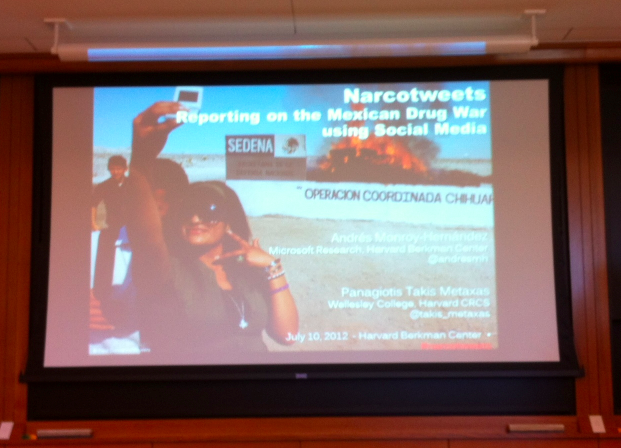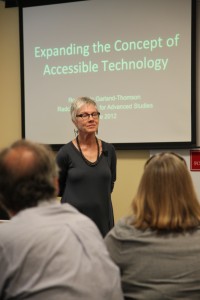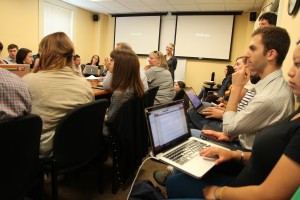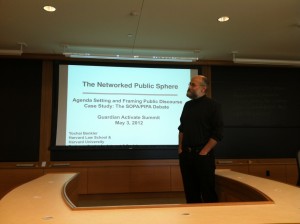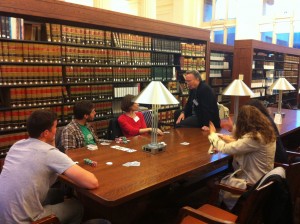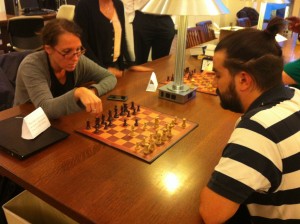by Hilda Barasa
Almost at the halfway mark of what is proving to be an incredibly busy and fulfilling summer, we had the pleasure of sitting down with two dynamic Berkterns whose interests in cyber security not only seam together flawlessly, but it has also transformed them into a formidable team. In between coffee and pretzel breaks, Nick and Gili will be found hunkered down by their laptops in the kitchen or conference room building the cybersecurity wiki, creating cybersecurity modules to be included in the H2O online learning platform and drawing up strategies for winning that next trivia game with their fellow Berkterns. In a rather hilarious interview, Nick and Gili talk to us about their experience and work with the Cybersecurity team so far as Nick reveals to all his favorite software…..
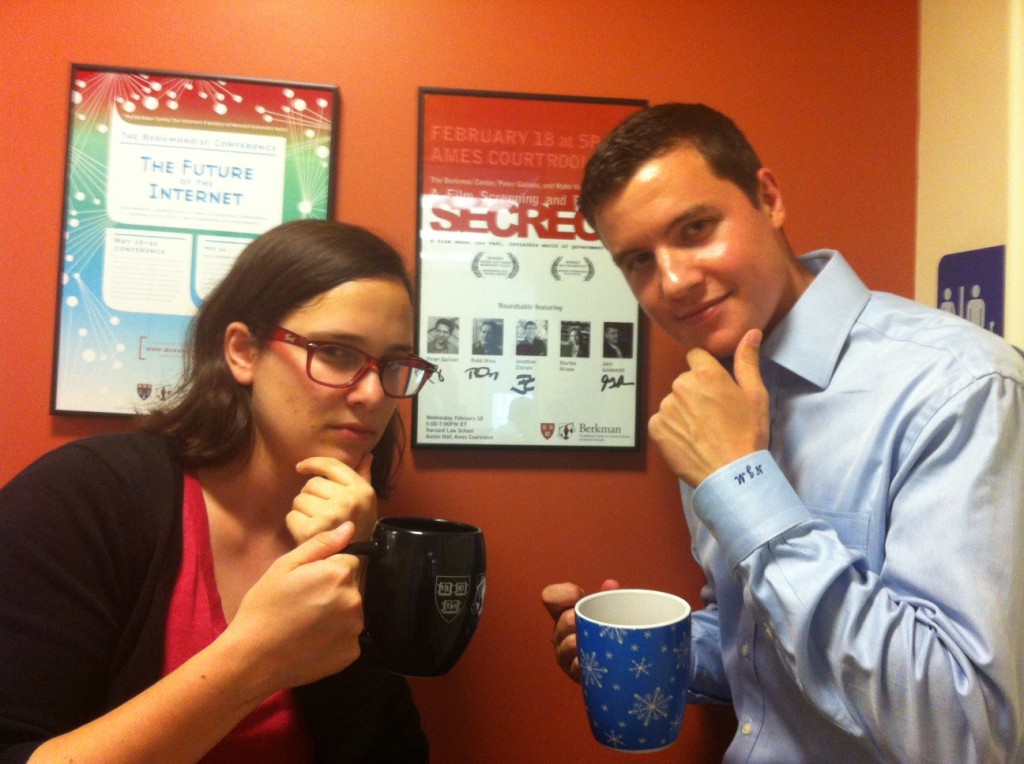
Royze: What projects are you currently working on each of you?
Gili: We are both in the Cybersecurity Project which includes the cybersecurity wiki and developing cybersecurity modules for the H2O platform. I’m also working on a case study for the Information Quality Project.
Nick: I’m currently concentrating on the cyber security project.
Royze: How do you feel about Excel?
Nick: Is that a loaded question? You know I love Excel. Why would you ask me that?
Royze: Because I always see you on it all the time!
Nick: I love Excel! It’s probably the best software Microsoft will ever produce.
Gili: Does Excel have any limitations?
Nick: It has no limitations! Only the user is limited. Excel is a robust piece of software. I think that all of the models in the financial industry were probably done in Excel.
Royze: In the last intern’s hour, we had a talk with Jonathan Zittrain. What’s your take on his general idea on cyber governance?
Nick: Just one? The man’s brilliant.
Gili: Yeah, I thought he was a very effective speaker and really enjoyed his concept of hardware remaining generic.
Nick: I think it was pretty amazing how he was there at the ground level for the development of many key aspects of the internet. It was pretty surprising when he showed us the picture that he took of Jon Postel.
Gili: It made a lot of sense in light of what we try to do i.e. make technical information accessible to the wider public so that people can have an understanding of what internet protocol means and still understand the politics behind it and the economic incentive that made ICANN (Internet Corporation for Assigned Names and Numbers) what it is. That’s something that the cyber security project can try and implement
Royze: You mentioned that you have been working with the H2O team trying to bring what you are working on onto the platform. How is that going?
Gili: So we just met with Kendra and Dustin to get introduced to the platform as we don’t have much experience working with it. We are now at the point where we want to convert the readings we have been dealing with these past few weeks into a format that would make sense as a course.
Nick: One of the things most interesting about cyber security is how, depending on the lens you use to look at it, there are numerous different topics that are of potential interest. H2O, with its ability to remix playlists, lends itself well to teaching this (cybersecurity) material. Whatever lens the teacher, student, or self-starter uses, they’ll be able to simplify it to their needs. It should work great.
Gili: One of our assignments is to develop a fundamentals model for people who are not very familiar with cybersecurity. Some of our mutual discussions have led us to see this model differently because what is very fundamental in terms of technological concepts to someone with a computer science background is very different from someone who will approach it with an international law perspective or perhaps governance or politics. Even just talking about ICANN would entail talking about packets and routers and ISPs with someone looking into the computer science elements of it, while a political scientist will look at the politics and financial incentives and impact of the organization. This shifting lens is really determining the material we look to include and H2O is a great platform to account for all these users by remixing playlists.
Royze: Were you both around for Anya Kamenetz’s talk where she addressed online learning and how thousands of people have access to Kyocera and all the other learning sites? Supposing that was a platform for introducing cyber security classes, who do you feel would be your audience when you talk about cyber security? Who should be more concerned? Is there a place for the youth to learn on it?
Nick: Absolutely the youth can learn from it. Again, I want to say that it depends on how you approach it. Almost anyone on the internet has reason to be interested in cyber security issues and could learn from the material in the course. That said, a lot of the aspects of it are very technical, especially regarding the legal and computer protocol sides of it.
Gili: We always talk about cybersecurity and to what extent issues such as cyber war are concerns for the general public or whether military strategists, policy makers and international law advisers can hash it out. But there is always an element of the individual and his/her computer, their own privacy and security and that’s definitely something that should concern everyone.
Royze: Nick, if you can talk about it, to what extent did your time at the military influence how you look at cyber security or information management?
Nick: My interest in cyber security is mostly personal. In my opinion, it is the one of the largest future challenges for the military, and they’re currently addressing their future role in the cyber-domain through the formation of USCYBERCOM, which handles many cyberspace issues for the DoD. So from a personal perspective, it is an interesting up and coming topic, but as for working with it directly in the military, I really did not.
Royze: Where does your background or interests come in, Gili?
Gili: I’m interested in the critical studies of technology, science and policy making and what qualifies experts to carve out domains to advise on when it comes to incredibly complex issues in these fields. I got wrapped into the cybersecurity discourse because I felt it became a very dominant issue in international relations. Coming from Israel, which is often a participating actor in a lot of discussions around Stuxnet where nobody can say for sure what their role is, there are a lot of unanswered questions that I find intriguing . I’d be very interested in how international relations and the conduct of war will shift as we move towards using more sophisticated and often invisible technologies.
Royze: Moving forward, where do you see yourself including issues of cyber security in your careers? Is it something you want to delve into more or teach others in your own ways?
Gili: So I am currently working on my senior thesis on _______________________ and at least a chapter of it will be dedicated to cybersecurity. I am looking at sovereignty in cyberspaces and a lot of it does come back to how you conduct war or protect cyber borders. Hopefully my work this summer will facilitate this project.
Nick: I’m going to law school and am interested in national security law. This is a growing topic in the field, and I see myself in the future taking Jack’s class. Hopefully down the line when I make my way to DC, I will be able to help formulate and implement some informed thoughts on the topic.
Royze: What do you like about working with each other? Do you play off of your strengths and common interests or not?
Nick: We only email. This is actually the second time we are seeing each other.
Gili: Yeah, we never see each other. We just had lunch where we sat down and IM’d each other.
Nick: On a more serious note…
Gili: Nick is very organized and on top of things. He writes very well and sends very formal emails that are very clear
Nick: Yes, formality is key to a good e-mail.
Gili: Formality is key with him. We can never be friends because he keeps this professional, stern distance.
Nick:…except during trivia……
……Gili is very knowledgeable on the topic and actually took a class with Jack which is very impressive. She therefore has a much broader understanding of cyber security and is a much better writer than me. I read her synopsis and immediately used it as a format for mine. I also appreciate the fact that she can really focus on cyber security even with her other projects. Sometimes it seems like she is doing twice the work that I do, and faster!
Royze: Tying in your experience here at Berkman, is there any other group you want to work more with or get to know more?
Gili: The lounge people are awesome.
Nick: Yeah! I wish we had more time interacting with the professors. I honestly feel we could have done 3-4 hrs with JZ. Perhaps intern’s hour should start at 2 and stretch till 6.
Royze: What are your favourite blogs?
Gili: Do we have to say Jack’s blog? [Jack Goldsmith leads the cybersecurity wiki project and blogs about national security and legal issues here]
Nick: Honestly, the Lawfare blog is pretty good
Gili: Other than Jack’s blog, I read XKCD which is more of a comic strip than a blog
Royze: If anyone wanted to learn more about cyber security, where should they go?
Gili: shameless plug – cyber.law.harvard.edu/cybersecurity
Any last words?
Gili & Nick: Free coffee! We love that – please communicate our sincere appreciation to the powers that be for that!

